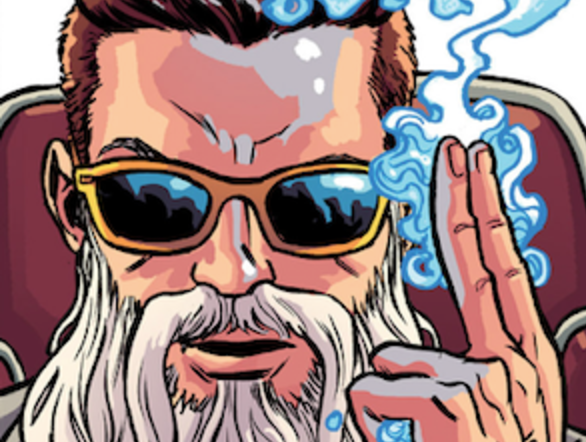Review: Curse Words #1 Explores Benefits of Good, Evil, Free Will, Hot Dogs, and Sunglasses

Have you ever felt that your life has no meaning? Or maybe just that your talents and self-actualization are being co-opted by The Man, against your own best interests? Wouldn’t it be really freaking awesome if your best friend was a talking koala named Margaret? If you answered “yes,” (and let’s be honest, who wouldn’t?) then I have the comic for you…
Curse Words is a new title from Charles Soule and Ryan Browne, about a wizard named Wizord who is sent by an evil overlord to destroy the Earth. But Wizord decides that it’s actually kind of nice here, what with all the free will and hot dogs and such. So, he abandons his destructive spell in favor of using his magic to do good in the world, and to make a little cash on the side (I mean, we do have free will but also, capitalism). Wizord’s evil overlord, Sizzajee, is about as thrilled with this development as you’d expect.
This comic is outrageous and hilarious, but its humor hits close to home. Who can’t relate to feeling dissatisfied with certain obligations, when your heart just isn’t in them? I’m sure we’ve all worked for some real jerk bosses, but Sizzajee is on another level of jerkitude. And when he sends his minion to rebuke Wizord for his failure, it is strongly implied that there’s more to Wizord’s defection than altruism or independence. This begs the question; does it matter why he doesn’t go through with the spell? Does it really make Wizord a fundamentally bad guy if he has selfish motives for good deeds?
Magic is as much about transformation as it is about power. There’s a lot of flashy magic and fighting in Browne’s artwork, but transformation also figures strongly in the visual language of Curse Words. Wizord’s friend Margaret begins the story as a much-reviled rat, but transforms into a koala after selecting that form on “cuteanimals.com,” presumably so she’ll be more liked. Wizord’s eyes go from solid white and thickly black rimmed to more conventional, blue human eyes when he is under a “spell of understanding.” And of course, he cuts his hair and gets some stylish new clothes. (He also starts wearing sunglasses a lot, although this may just be to look cool, as one does.)
I would be remiss here if I did not call out the excellent lettering work by Browne, Chris Crank, and Shawn Depasquale. Using jumbled, anagrammed lettering to indicate lingual misunderstanding between Wizord and the denizens of New York is a nice touch. Wizord’s spell of understanding causes the letters to unscramble and form discernable words, a technique that tells Wizord’s journey of acclimating to New York with visual cues, even when that journey is also happening with dialogue.
Another subtle but effective piece of visual storytelling is the horror vacui in nearly every panel. There is very little empty space, regardless of whether the setting is a crowded city space or in the sky above it. Browne fills each panel to the edges with detail and action, pulling close on his subjects and framing them with rubble, smoke, or swirls of magic if no background or prop takes up the space around them. One notable exception to this is the scene in which Wizord envisions a potential new life and makes the fateful decision to divest himself of Sizzajee’s evil plan. And it’s not just the momentary visual breathing room that invites the reader to pause at such a crucial turning point. We also get a flash of poignant insight into just why Wizord might be looking for a change in the first place. (For the sake of avoiding spoilers, I won’t include images of the scene here. Go read it! You’ll see what I mean.)
In art, Horror vacui refers to a lack of empty space; in science, it hearkens back to Aristotle’s assertion that, “Nature abhors a vacuum.” So, if Wizord has indeed renounced the malevolence he enacted in the service of Sizzajee, what is going to take its place? Something equally as sinister? Something good? Even if Wizord has been really good at being really bad, it doesn’t seem that he had much of a choice before. Now, he’s fighting to make his own decisions. After reading Curse Words #1, I’d say there is every reason to believe that, while Wizord may be “the devil’s devil” back home, he could make an honest go of things in New York. I have high hopes for Wizord. What can I say? Maybe the cool sunglasses won me over. And as for Margaret the magical koala—how could someone so cute possibly be bad? #teammargaret
Tia Vasiliou is a digital editor at comiXology and co-host of the weekly ComiXologist podcast. Her best friend is a Cornish Rex cat named Lydia, who unfortunately does not talk or perform magic (that we know of…) but is extremely bad, so there goes that cuteness theory, anyway.
Want more stories like this? Become a subscriber and support the site!
—The Mary Sue has a strict comment policy that forbids, but is not limited to, personal insults toward anyone, hate speech, and trolling.—
Follow The Mary Sue on Twitter, Facebook, Tumblr, Pinterest, & Google+.
Have a tip we should know? tips@themarysue.com